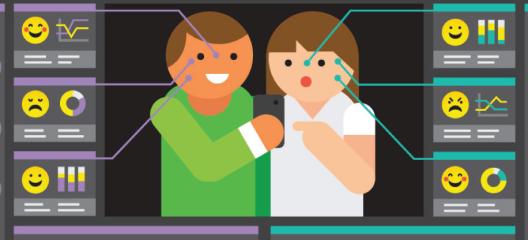
October 24th 2025

Software That Knows What Your Face Is Really Saying

Emotion analytics promises new insight into true feelings lurking behind facial expressions.
Emerging Apps for Emotion Analytics:
- Test movie trailers for emotional impact.
- Detect patient depression and pain.
- Recognize when drivers fall asleep at the wheel.
- Aid in business negotiations over video chat.
There’s no hiding your poker face from marketers anymore.
The emergence of emotion analytics software promises to give businesses new insight into what people are feeling—even if they don’t say a word. The software uses analytics, data mining and machine learning to capture live video of people’s faces and map their countenances to a range of facial expressions. It turns out that tracking the subtlest movement—the subconscious flicker of a raised eyebrow or the wrinkling of the nose—can reveal a wide range of specific, underlying emotions.
This technology goes further than analyzing smiles and frowns. Startups such as Affectiva, Emotient and Realeyes have brought technology to market that breaks down facial movements into more nuanced expressions. More than 128 combinations of brow and eye movements express surprise, for instance, says Marian Bartlett, co-founder of Emotient, based in San Diego. “This is what enables us to learn how facial expression predicts consumer behavior, such as whether someone will reject a financial offer,” she says.
“In the future, we believe an emotion chip will be part of smart devices.”
- Gabi Zijderveld, vice president of marketing, Affectiva
Training Algorithms for Emotional Intelligence
Waltham, Mass.-based Affectiva says it has analyzed 2.6 million face videos from people in 75 countries. In doing so, the company has gathered more than 7 billion emotion data points to train its algorithms to detect expressions across a wide variety of ethnic and age groups. In the nearly five years since the company’s start, Affectiva’s software has been used by 1,400 brands to measure people’s responses to everything from product testing to advertisements.
There’s good reason to do so. “Brands know that an emotionally engaged consumer buys your products,” says Gabi Zijderveld, Affectiva’s vice president of marketing.
Hollywood studios now use Affectiva’s technology to test new movie trailers, even pinpointing—by the second—which segments of the clip make the most impact. Kellogg Co.’s European executives used the software to monitor the emotional reaction to commercials for the manufacturer’s Crunchy Nut cereal. They used the data to decide to put more money and airtime behind the ad, which proved to be still funny on repeated viewings.
Beyond Marketing Apps
Future uses of emotion analytics software extend beyond marketing. Professors teaching online courses could see when students get bored or confused and could tweak lessons accordingly. Doctors could screen for depression and detect pain during telemedicine visits. Politicians could use the tool for polling. Employers could screen job applicants by asking them to make a video of themselves instead of sending a resume. Cars could be able to detect when you’re sleepy at the wheel. “In the future, we believe an emotion chip will be part of smart devices,” says Zijderveld.
Already, Skype competitor ooVoo Labs is working with Affectiva to build a number of apps, including one to be released later this year that can reveal emotions during mobile video chats. The software could shed light on a long-distance business negotiation, such as detecting a smirk that reveals you’re not persuading the other party. “Creating an emotional layer over live video allows for more intimate communications,” says JP Nauseef, managing director of ooVoo Labs.
The Privacy Challenge
All the talk of analyzing expressions and moods brings up obvious privacy concerns. What if police could read the emotions of crowds, or husbands could see if a spouse is lying, or employers could spy on workers?
What if the technology were combined with surveillance or facial recognition technology? Emotion analytics alone is not a major threat, but the technology becomes worrisome when it’s misused or combined with other technologies that track people or collect personal data, says Robert Neivert, COO of Private.me, a company that enables Internet-goers to search online privately without storing any personal information. “We’re stripping away our inner self that makes our society function,” Neivert says. “Imagine if you said everything you thought?”
Most executives touting emotion analytics remain wary of references to spying or using the software out of context or without consent. “We are huge proponents of opt-in for all scenarios where consumers have a reasonable expectation of privacy,” says Ken Denman, president and CEO of Emotient.
Denman prefers to focus on the power for marketers, who are Emotient’s primary customers. “Even when we try to keep a poker face, our emotions can still show on our face, even for a fraction of a second,” Denman adds. “Marketers understand that power, because emotions drive spending.”
src: ca.com




